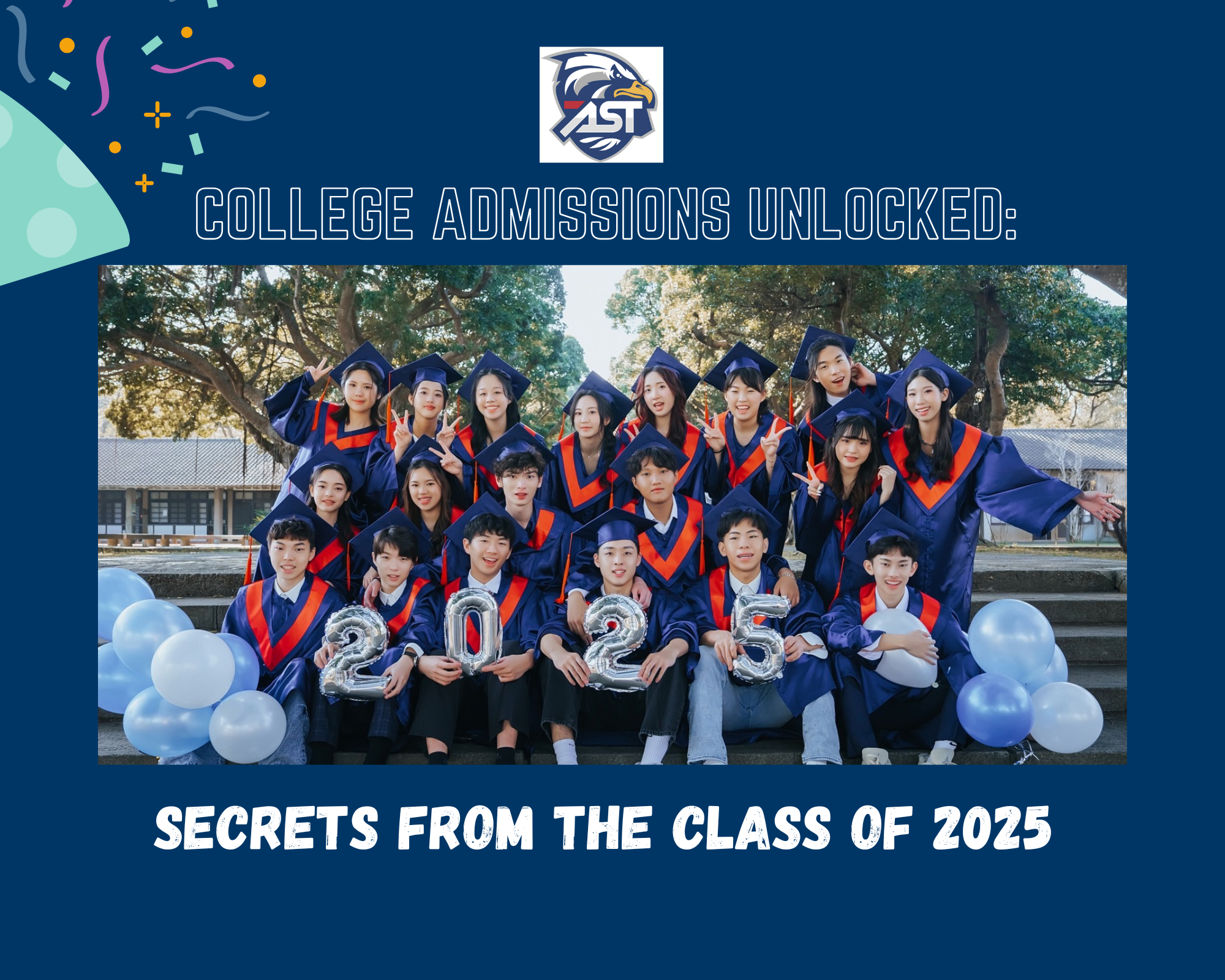TAIMUN: A Look Behind the Scenes
Written by Sophia Yu ('29) Nero Ho ('29) TAIM...more
Written by Jadon Lin ('27) & Curtis Shih ('27)
The college admissions process: a dreadful and grueling experience notoriously known for stressing and burning high school students out. However, it might not have to be this stressful. The Write For Delight Club has interviewed some seniors at AST regarding their advice about the entire college process. Here is what they recommend:
Study like a teacher teaching a class
We often think of studying like this: sitting down at a desk with a large textbook open and a notebook on the side for note-taking. Even though this conventional method might seem effective, envisioning yourself as a teacher explaining the materials you are studying unlocks another level of understanding. One senior said, and I quote: “I turn my bedroom window into a whiteboard and pretend I’m teaching the content to the stuffed animals on my bed.” This method might seem counterintuitive. However, it helps you understand the concepts better because when you teach, you try to look for shortcuts and think of the simplest way possible to express the content verbally. This allows you to break down your thinking into its simplest forms, and once you've got that down, understanding will be a breeze.
Write with emotion
Who, what, when, where, how: one of the most standard and straightforward foundations of a good essay. The prompts allow you to address everything you need to compose a decent yet interesting essay. However, colleges don’t want conventional essays; they want unique essays tailored to you, your life experiences, and you as a person. This is when emotion comes in clutch. When writing an essay, says our senior, you shouldn’t be looking at yourself; you should look into yourself. If you write your essay with a third-person perspective, meaning looking at yourself from an outside perspective, everything about you will seem artificial; it will be about your achievements, goals, and work you’ve done. But what good is that to colleges? Instead, look inside. What did you gain from all the activities? How did you grow from the experience? Accomplishment is easy; it's on your resume. Talking more about what it means is what matters; it's not what you have done but what you have learned.
Start with what you like
When facing an overwhelming amount of materials to study, especially during AP weeks, it is easy for students to slack off and procrastinate. The stress of having to study countless materials makes it difficult for students to even begin. Our seniors shared a helpful strategy: start your study sessions with your favorite subject, then slowly work towards the more difficult or less interesting subjects. Starting is often the most difficult part, but starting with what you enjoy the most can help build your study momentum. By the time you work on your least favorite material, you will have already built up a momentum that can keep you focused and locked in. It's like warming up your brain with something easier and simpler before working towards more complex and difficult subjects.
Align extracurriculars with your majors
Many students tend to choose their extracurriculars based on what they believe will “look good” on their resume for college applications, instead of selecting ones that reflect their real academic interests or goals. Oftentimes, students are tempted to choose these good-looking or impressive-sounding extracurriculars; however, these extracurriculars may not align with your future major at all and would have little to no benefit for your college applications. Our seniors suggested selecting extracurriculars that best align with your intended majors, as these activities can further demonstrate and highlight your interest and passion for this specific subject. Although sometimes community service-centered extracurriculars can benefit all majors, colleges would be more impressed if your extracurriculars matched your academic story and major.
Special thanks to John Kao, Song Kim, Ian Liu, and Angel Weng ('25) for their generous sharing. We believe their insights and experience will benefit our current students. We wish them all the best as they embark on their new journey!

--------------------------------------------------------------------
大學入學申請的過程是一段令人畏懼且艱辛的經歷,惡名昭彰地以其帶給高中生的壓力與倦怠而聞名。然而,這個過程或許不必如此令人緊張。Write for Delight社團採訪了幾位AST本屆的畢業生,以下是他們關於大學申請過程的建議:
像老師教課一樣學習
我們通常認為的學習是這樣的:坐在書桌前,攤開一本厚厚的教科書,旁邊放著筆記本來記筆記。即使這種傳統的方法看似有效,但想像自己是一位老師,向他人解釋我們正在學習的內容,會開啟另一層次的理解。一位畢業生說:「我把我的臥室窗戶變成白板,假裝我在向我床上的絨毛玩具們講解內容。」這種方法可能看似不一般,然而,它能幫助我們更好地理解概念,因為當我們教導時,會試著尋找捷徑,並思考用最簡單的方式口頭表達正在教的內容,這能讓人將思考分解成最簡單的形式,一旦掌握了這些基本形式,理解就會變得容易得多。
帶著情感寫作
人、事、時、地、為什麼:這是優秀文章最標準且直接的基礎之一,讓我們得以涵蓋所有需要寫出既體面又有趣的文章的要素。然而,大學不想要千篇一律的文章;他們想要獨一無二、專為你量身打造的文章,內容關於你的生活經歷以及你這個人。這時,情感就派上了用場。我們的畢業生說,當你寫作時,不應該「看著」自己;應該看「進」自己。如果用第三人稱寫你的文章,意即從外部視角看待自己,那麼關於你的一切都會顯得空洞、只會是你的成就、目標和你所做的工作。但大學知道這些有什麼用呢?相反地,向內看。你從所有的活動中獲得了什麼?你從這些經驗中成長了多少?成就很容易,它會寫在你的履歷上。更深入地談論它的意義才重要;重點不是你做了什麼,而是學到了什麼。
從喜歡的事物開始
當面對大量的學習資料時,尤其是在準備大學先修課程(AP)考試的那幾週,學生很容易鬆懈和拖延,必須研讀無數資料的壓力讓學生難以開始。我們的畢業生分享了一個有用的策略:從你最喜歡的科目開始讀起,然後慢慢地轉向更困難或較不感興趣的科目。開始往往是最困難的,但是從你最喜歡的開始,能幫助你建立學習的動力。當你開始念最不喜歡的內容時,你已經建立了一定的動力,可以讓你保持專注和投入。這就像在處理更複雜和困難的科目之前,先用更容易和更簡單的事情來替大腦暖身。
參與的課外活動要與你的主修相關
許多學生傾向於根據他們認為在大學申請履歷上「看起來不錯」的內容,來選擇他們的課外活動,而不是選擇那些能反映出他們真正的學術興趣或目標的活動。通常,學生會受到誘惑去選擇看起來不錯,或聽起來令人印象深刻的課外活動;然而,這些課外活動可能根本與你未來的主修不符,並且對你的大學申請幾乎沒有任何益處。畢業生建議選擇最符合你預期主修的課外活動,因為這些活動可以進一步展示並強調你對這個特定科目的興趣和熱情。雖然有時以社區服務為中心的課外活動可能對所有主修都有益,但如果你的課外活動與你的學術經歷和主修相符,會讓你更出色。
特別感謝John Kao, Song Kim, Ian Liu, and Angel Weng ('25)的慷慨分享。相信他們的見解和經驗將會使學生們受益良多。祝福他們在展開大學新旅程時一切順利!
林家丞、施沅佑 ('27) 撰稿